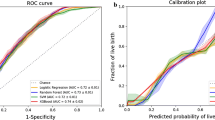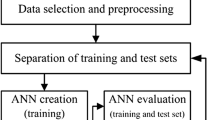Abstract
Purpose
To assess whether machine learning methods provide advantage over classic statistical modeling for the prediction of IVF outcomes.
Methods
The study population consisted of 136 women undergoing a fresh IVF cycle from January 2014 to August 2016 at a tertiary, university-affiliated medical center. We tested the ability of two machine learning algorithms, support vector machine (SVM) and artificial neural network (NN), vs. classic statistics (logistic regression) to predict IVF outcomes (number of oocytes retrieved, mature oocytes, top-quality embryos, positive beta-hCG, clinical pregnancies, and live births) based on age and BMI, with or without clinical data.
Results
Machine learning algorithms (SVM and NN) based on age, BMI, and clinical features yielded better performances in predicting number of oocytes retrieved, mature oocytes, fertilized oocytes, top-quality embryos, positive beta-hCG, clinical pregnancies, and live births, compared with logistic regression models. While accuracies were 0.69 to 0.9 and 0.45 to 0.77 for NN and SVM, respectively, they were 0.34 to 0.74 using logistic regression models.
Conclusions
Our findings suggest that machine learning algorithms based on age, BMI, and clinical data have an advantage over logistic regression for the prediction of IVF outcomes and therefore can assist fertility specialists’ counselling and their patients in adjusting the appropriate treatment strategy.



Similar content being viewed by others
References
Adamker G, Holzer T, Karakis I, Amitay M, Anis E, Singer SR, et al. Prediction of shigellosis outcomes in Israel using machine learning classifiers. Epidemiol Infect. 2018;146(11):1445–51.
Deo RC. Machine learning in medicine. Circulation. 2015;132(20):1920–30.
Jovic S, Miljkovic M, Ivanovic M, Saranovic M, Arsic M. Prostate cancer probability prediction by machine learning technique. Cancer Invest. 2017;35(10):647–51.
Obermeyer Z, Emanuel EJ. Predicting the future - big data, machine learning, and clinical medicine. N Engl J Med. 2016;375(13):1216–9.
Blank C, Wildeboer RR, DeCroo I, Tilleman K, Weyers B, de Sutter P, et al. Prediction of implantation after blastocyst transfer in in vitro fertilization: a machine-learning perspective. Fertil Steril. 2019;111(2):318–26.
Guvenir HA, Misirli G, Dilbaz S, Ozdegirmenci O, Demir B, Dilbaz B. Estimating the chance of success in IVF treatment using a ranking algorithm. Med Biol Eng Comput. 2015;53(9):911–20.
Hafiz P, Nematollahi M, Boostani R, Namavar JB. Predicting implantation outcome of in vitro fertilization and intracytoplasmic sperm injection using data mining techniques. Int J Fertil Steril. 2017;11(3):184–90.
Uyar A, Bener A, Ciray HN. Predictive modeling of implantation outcome in an in vitro fertilization setting: an application of machine learning methods. Med Decis Making. 2015;35(6):714–25.
Vogiatzi P, Pouliakis A, Siristatidis C. An artificial neural network for the prediction of assisted reproduction outcome. J Assist Reprod Genet. 2019;36(7):1441–8.
Khosravi P, Kazemi E, Zhan Q, Malmsten JE, Toschi M, Zisimopoulos P, et al. Deep learning enables robust assessment and selection of human blastocysts after in vitro fertilization. NPJ Digit Med. 2019;2:21.
Manna C, Nanni L, Lumini A, Pappalardo S. Artificial intelligence techniques for embryo and oocyte classification. Reprod Biomed Online. 2013;26(1):42–9.
Martinez RM, Baccarelli AA, Liang L, Dioni L, Mansur A, Adir M, et al. Body mass index in relation to extracellular vesicle-linked microRNAs in human follicular fluid. Fertil Steril. 2019;112(2):387–96 e3.
Machtinger R, Gaskins AJ, Racowsky C, Mansur A, Adir M, Baccarelli AA, et al. Urinary concentrations of biomarkers of phthalates and phthalate alternatives and IVF outcomes. Environ Int. 2018;111:23–31.
Cross SS, Harrison RF, Kennedy RL. Introduction to neural networks. Lancet. 1995;346(8982):1075–9.
Robnik Šikonja M, Kononenk I. An adaptation of relief for attribute estimation in regression. In: Fisher DH (editor). Machine Learning: Proceedings of the Fourteenth International Conference; 1997 July 8-12; Nashville, (TN): Morgan Kaufmann, 1997: 296-304.
Ratna MB, Bhattacharya S, Abdulrahim B, McLernon DJ. A systematic review of the quality of clinical prediction models in in vitro fertilisation. Hum Reprod. 2020;35(1):100–16.
Curchoe CL, Bormann CL. Artificial intelligence and machine learning for human reproduction and embryology presented at ASRM and ESHRE 2018. J Assist Reprod Genet. 2019;36(4):591–600.
Siristatidis C, Vogiatzi P, Pouliakis A, Trivella M, Papantoniou N, Bettocchi S. Predicting IVF outcome: a proposed web-based system using artificial intelligence. In Vivo. 2016;30(4):507–12.
Acknowledgments
We would like to thank Dr. Tamar Berman for her insightful comments.
Availability of data and material
Data will be shared upon request.
Funding
This work was supported by the National Institutes of Health (grant numbers P30ES00002, R21ES024236, and K99ES026648) and by the Environment and Health Fund, Israel (grant award no. RPGA1301).
Author information
Authors and Affiliations
Corresponding author
Ethics declarations
Conflict of interest
The authors declare that they have no conflict of interest.
Ethics approval
This study was performed in line with the principles of the Declaration of Helsinki. Approval was granted by the Ethics Committee of Sheba (8707/11).
Consent to participate
All patients signed an informed consent according to the IRB approval.
Consent for publication
Yes
Code availability
Not applicable
Additional information
Publisher’s note
Springer Nature remains neutral with regard to jurisdictional claims in published maps and institutional affiliations.
Electronic supplementary material
ESM 1
(DOCX 28 kb)
Rights and permissions
About this article
Cite this article
Barnett-Itzhaki, Z., Elbaz, M., Butterman, R. et al. Machine learning vs. classic statistics for the prediction of IVF outcomes. J Assist Reprod Genet 37, 2405–2412 (2020). https://doi.org/10.1007/s10815-020-01908-1
Received:
Accepted:
Published:
Issue Date:
DOI: https://doi.org/10.1007/s10815-020-01908-1




